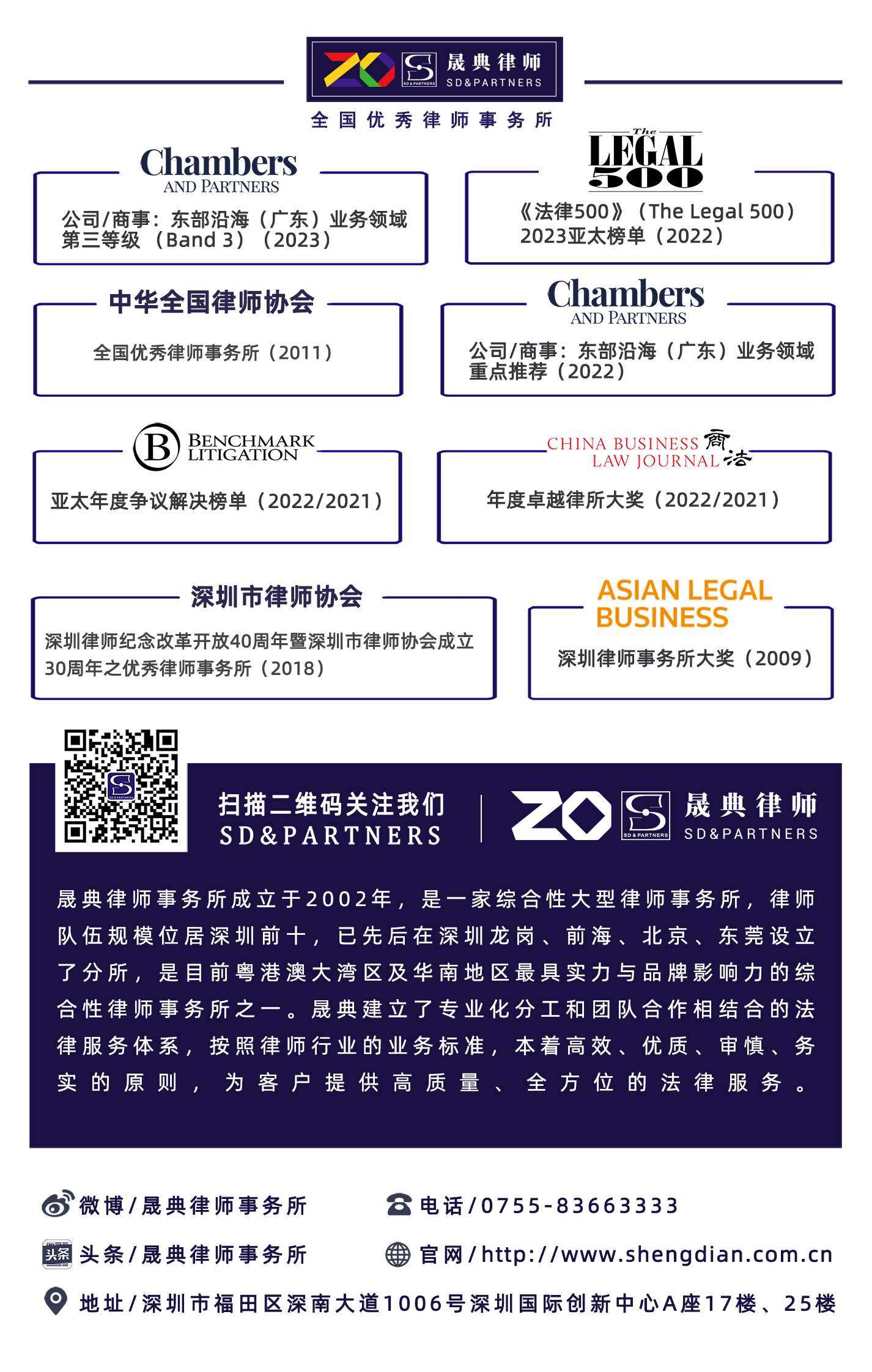Shengdian Watch | Also talks about the dispute over control of Shanshan shares
![]() Loading...
Loading...
![]() 2023.03.31
2023.03.31
Mr. Zheng Ju adopted the corporate law route and Ms. Zhou Ting chose the inheritance route.
[I] Event Context
On February 10, Mr. Zheng Yonggang, a well-known Zhejiang businessman, died of a sudden heart attack. On March 2, Ningbo Shanshan Co., Ltd. (hereinafter referred to as Shanshan Co., Ltd., 600884.SH) issued an announcement stating that the board of directors nominated Zheng Ju as a non-independent director candidate for the company's tenth board of directors. On March 23, Shanshan held the first extraordinary general meeting of shareholders in 2023, and reviewed and approved the "Proposal on Election of Mr. Zheng Ju as a Director of the Company's Tenth Board of Directors." On the same day, Shanshan Co., Ltd. held the 40th meeting of the 10th board of directors, elected Zheng Ju as the chairman of the 10th board of directors of the company, and issued an announcement. It is reported that Zhou Ting, the widow of Zheng Yonggang, appeared at the scene on the same day. She told the shareholders present that she should become the actual controller of Shanshan shares based on the inheritance relationship. The board of directors deliberated the motion without its review and consent and released it to the public without authorization, which was illegal and wrong. On March 27, Shanshan shares issued an announcement stating that the results of this election are legal and valid; after the death of Mr. Zheng Yonggang, the original actual controller of the company, the company's shares and related rights and interests held by him will enter the inheritance process in accordance with relevant laws and regulations. The company's new actual controller. On March 28, the legal representative of Shanshan shares changed from Zheng Yonggang to Zheng Ju.
[2] Shareholding structure of the companies involved

[3] Mr. Zheng Ju: Corporate Law Path
So, Mr. Zheng Ju's board seat is as solid as a rock?
[4] Counterpart of the Articles of Association
Article 59 of the Articles of Association of Shanshan Co., Ltd. stipulates that in any of the following circumstances, the company shall convene an extraordinary general meeting of shareholders within 2 months from the date of the fact: (3) Individually or collectively holding more than 10% of the company's shares At the request of shareholders; when the board of (IV) deems it necessary; when the board of supervisors of the (V) proposes to convene; when two or more independent directors of the (VI) propose to convene. Paragraph 1 of Article 69 stipulates that when the company convenes a general meeting of shareholders, the board of directors, the board of supervisors and shareholders who individually or collectively hold more than 3% of the company's shares have the right to submit proposals to the company.
Accordingly, eligible right holders have the right to submit a proposal to the general meeting of shareholders to challenge Mr. Zheng Ju's seat on the board of directors.
[5] Ms. Zhou Ting: Inheritance Path
Ms. Zhou Ting to become a qualified sponsor, the path is to inherit the estate.
nheritance is the personal legal property left behind when a natural person dies. Since Mr. Zheng Yonggang indirectly holds shares in Shanshan through Ningbo Qinggang Investment Company Limited (hereinafter referred to as Qinggang Company), the acquisition of shares in Qinggang Company is equivalent to the acquisition of shares in Shanshan. For ease of explanation, this paper limits the object of the division of the estate to the 51% stake in Qinggang Company held by Mr. Zheng Yonggang.
The Civil Code provides that the premarital property of one of the spouses is the personal property of one of the spouses. At the same time, it is stipulated that, unless there is an agreement, half of the property jointly owned by the husband and wife shall be divided into the spouse and the rest shall be the estate of the decedent. According to public information, Mr. Zheng Yonggang and Ms. Zhou Ting registered for marriage in December 2017 and had three children. When Mr. Zheng Yonggang died, Mr. Zheng Yonggang and Ms. Zhou Ting were husband and wife. Therefore, the first step in dealing with Mr. Zheng Yonggang's estate is the division of property.
Qinggang Company was established on September 1, 2014. After its establishment, the shareholders and equity ratio have not changed. From the time sequence, the 51% equity of Qinggang Company held by Mr. Zheng Yonggang should belong to his personal property. Therefore, unless Mr. Zheng Yonggang and Ms. Zhou Ting have other written agreements, the 51% equity interest in Qinggang Company held by Mr. Zheng Yonggang is not the joint property of husband and wife. In other words, Ms. Zhou Ting was unable to obtain 1/2 of the 51% equity interest in Qinggang Company held by Mr. Zheng Yonggang through this first step.
However, according to Article 1062 of the Civil Code, the income from production, operation and investment during the marriage is the common property of the husband and wife. Therefore, unless Mr. Zheng Yonggang and Ms. Zhou Ting have other written agreements, the 51% equity value-added of Qinggang Company held by Mr. Zheng Yonggang since his registered marriage with Ms. Zhou Ting shall be the common property of the husband and wife. According to investigation, the total market value of Shanshan shares on December 30, 2017 was about 21.759 billion yuan, and the total market value on March 30, 2023 was about 39.393 billion yuan, and the market value growth during the period was about 17.634 billion yuan. At present, Mr. Zheng Yonggang actually holds 5.67 of Shanshan's shares. Assuming that he also holds 5.67 of Shanshan's shares on December 30, 2017, the investment income of Shanshan's shares held by Mr. Zheng Yonggang from December 30, 2017 to March 30, 2023 (which should actually be calculated to the date of estate distribution) is about 0.9998 billion yuan, and Ms. Zhou Ting has the right to share half of the money, namely 0.4999 billion yuan, if the proportion of Qinggang's equity held by Mr. Zheng Yonggang is converted (generally distributed in cash in practice), assuming A%, it should be owned by Ms. Zhou Ting. Accordingly, after the completion of the first step of division, Ms. Zhou Ting may hold a% stake in Qinggang Company, and the remaining (51-A)% stake in Qinggang Company is the estate of Mr. Zheng Yonggang.
According to public information, Mr. Zheng Yonggang's first order heir has three possibilities.
Possibly one, if Mr. Zheng Yonggang's parents are both alive, the heirs should be Ms. Zhou Ting (spouse), Mr. Zheng Ju (son), Ms. Zhou Ting's three children (children) and Mr. Zheng Yonggang's parents. The (51-A)% equity of Qinggang Company held by Mr. Zheng Yonggang should be divided into seven equal shares, and Ms. Zhou Ting and her children can share 4/7, in view of the fact that Ms. Zhou Ting is the legal guardian of her three minor children, the proportion of shares in Qinggang Company that Ms. Zhou Ting can control is equal to or greater than 29.143 (considering that Ms. Zhou Ting may hold A% of shares in Qinggang Company in the first step, the same below).
Possibly two, if Mr. Zheng Yonggang's father or mother is alive (note: only hypothetical analysis, without any disrespect, the same below), the heirs should be Ms. Zhou Ting (spouse), Mr. Zheng Ju (son), Ms. Zhou Ting's three children (children) and Mr. Zheng Yonggang's father or mother, Mr. Zheng Yonggang's (51-A)% equity of Qinggang Company, which should be divided into six equal shares, ms. Zhou Ting and her children can get a total of 4/6, then the proportion of shares in Qinggang Company that Ms. Zhou Ting can control is equal to or more than 34%.
Possibly 3, if Mr. Zheng Yonggang's parents are no longer there, the heirs should be Ms. Zhou Ting (spouse), Mr. Zheng Ju (son) and Ms. Zhou Ting's three children (children). The (51-A)% equity of Qinggang Company held by Mr. Zheng Yonggang should be divided into five equal shares, and Ms. Zhou Ting and her children should be divided into 4/5, the proportion of shares in Qinggang Company that Ms. Zhou Ting can control is equal to or greater than 40.8.
Based on any of the above possibilities, the percentage of Qinggang's equity that Ms. Zhou Ting can control will exceed that of Mr. Zheng Ju.
According to the current Company Law, the actual controller refers to the person who is not a shareholder of the company, but can actually control the company's behavior through investment relationship, agreement or other arrangement. Mr. Zheng Yonggang became the actual controller of Shanshan shares with his 51% stake in Qinggang Company, and Ms. Zhou Ting, who has the right to inherit more than half of the 51% stake in Qinggang Company, may of course also become the actual controller of Shanshan shares. Accordingly, Ms. Zhou Ting's previous claim that "based on the inheritance relationship, she should become the actual controller of Shanshan shares" is not groundless and possible.
So, what Ms. Zhou Ting meant by the role of the actual controller of Shanshan shares is a sure thing?
[6] Suspense
(I) whether Mr. Zheng Yonggang has a will
What can fight against legal inheritance is testamentary inheritance.
The Civil Code stipulates that after the commencement of inheritance, it shall be handled in accordance with legal inheritance; if there is a will, it shall be handled in accordance with testamentary inheritance or bequest. A natural person may dispose of his personal property by making a will in accordance with the law and designate the personal property to be inherited by one or more of the legal heirs.
Mr. Zheng Yonggang may distribute all or part of his 51% equity interest in Qinggang Company to Mr. Zheng Ju or/and Ms. Zhou Ting through a will. For example, Mr. Zheng Yonggang has previously made a will to dispose of his 51% stake in Qinggang Company. If the will is valid, it should be executed in accordance with his will.
Therefore, in the absence of determining whether Mr. Zheng Yonggang has a will and the details of the unknown will (if any), Mr. Zheng Ju, Ms. Zhou Ting and other legal heirs have unknown inheritance rights to 51% of the shares of Qinggang Company, and there is still suspense about the dispute over the control of Shanshan shares.
(II) Zhou Jiqing's Choice
Zhou Jiqing holds a 41% stake in Qinggang Company, which is higher than the 40.8% stake in Qinggang Company that Ms. Zhou Ting may control. Zhou Jiqing himself may also become the actual controller of Shanshan shares.
However, if Zhou Jiqing and one of Mr. Zheng Ju or Ms. Zhou Ting reach an agreement (either orally or in writing) to become a "concerted action person", it will become the last straw-who will "win".
[7] And then double benefit
Lawyer Huang Ting
[Practice Introduction]
Graduated from the Law School of Shenzhen University, he is now a senior partner of Shengdian Law firm, deputy secretary of the party committee of Shengdian, head of Shengdian bankruptcy administrator (second level), deputy editor-in-chief of Shengdian lawyer Review (Law Publishing House), arbitrator of Maoming Arbitration Commission, member of the Corporate Law Professional Committee of Guangdong and Shenzhen Bar Associations, and member of the Business Development Committee of Shenzhen Bankruptcy Administrators Association. He is now an expert/lawyer of Shenzhen Baoan District Investment Management Group Co., Ltd., Shenzhen Water Planning and Design Institute Co., Ltd. (301038.SZ), China Resources Property Technology Service Co., Ltd., Shenzhen Enterprise Evaluation Association (SZEEA), Shenzhen Dingcheng Expert of Technical and Economic Evaluation Center, with securities qualification, private equity fund senior manager qualification, listed company independent director qualification.
Lawyer Huang Ting has rich experience and good professional ability in corporate legal affairs (including corporate governance and compliance, equity investment and financing, commercial transactions, shareholder/partner interest disputes and other dispute resolution), real estate legal affairs (including real estate ownership confirmation, transaction, lease and other dispute resolution), enterprise bankruptcy liquidation (including reorganization, debt restructuring, etc.), outstanding performance and outstanding achievements, for a large number of clients to provide professional responsibility, good efficiency of legal services.Lawyer Huang Ting is especially good at grasping the focus and key issues of commercial transactions and dispute resolution. He creatively uses business thinking and transaction logic to provide customers with unique and effective composite solutions, helping customers achieve far more than expected solutions in many major cases/commercial transactions, and is deeply recognized and trusted by customers and partners.
[Main practice field]
Corporate counsel and compliance, equity, anti-commercial bribery legal affairs, corporate investment and financing, debt restructuring, bankruptcy liquidation and reorganization legal affairs, difficult, major civil and commercial dispute resolution legal affairs.



